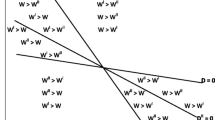Abstract
We live in a world of climate injustice. People in wealthy countries emit large amounts of greenhouse gasses, whose effects will be particularly adverse to people in poor countries who have not received the benefits of past emissions. Although these injustices are deeply embedded in power asymmetries, they could be ameliorated if wealthy societies were to take broad views of their own self-interests. To do so would require, in some instances, changes in the default rules, embedded in sovereignty, that have inhibited positive changes. To ensure that such positive changes ensue will require new and well-designed institutions, two of which are proposed. An Institute for Climate Finance would facilitate offset arrangements by which rich countries pay for emissions reductions in poorer countries. An Institute for Climate Innovation would facilitate the transfer of innovative low- or zero-emission energy technology to developing countries.
Similar content being viewed by others
Notes
As Angus Deaton shows, any precise statements of this sort depend on arbitrary decisions about where they draw the poverty line, and on statistical conventions. Nevertheless, the general trend, especially in large, rapidly growing countries such as India and China, is clear. See Deaton, The Great Escape: Health, Wealth, and the Origins of Inequality (Princeton: Princeton University Press, 2013), chapter 6.
IPCC, AR5, 2014. Summary for Policymakers, Climate Change 2014: Impacts, Adaptation and Vulnerability. Report of Working Group 2. Cambridge: Cambridge University Press. Accessed online February 28, 2018.
IPCC 2013 (AR5, WG1). Climate Change 2013: the Physical Science Basis. Summary for Policymakers. Cambridge: Cambridge University Press, accessed on February 28, 2018. Other greenhouse gasses have also risen markedly since that time.
For this distinction, see Robert O. Keohane and Joseph S. Nye, Power and Interdependence (1977; reprinted 2001).
Henry Shue. 2014. Climate Justice: Vulnerability and Protection. Oxford: Oxford University Press. See especially Chapter 17, pp. 319–339.
Judith Jarvis Thompson, “Killing, Let Die, and the Trolley Problem.” 59 The Monist 204-17 (1976).
Mancur Olson, 1965. The Logic of Collective Action. Cambridge: Harvard University Press.
Henrich, Joseph, et al. “’Economic Man’ in cross-cultural perspective: behavioral experiments in 15 small-scale societies.” Behavioral and Brain Sciences 28: 795–855.
Burke, M. S.M. Hsiang, E. Miguel, “Climate and Conflict.” Annual Review of Economics 2015. Carleton, Tamma A. and Solomon M. Hsiang, “Social and Economic Impacts of Climate.” Science 353, Issue 6301, 9 September 2016.
Geoffrey Brennan and Philip Petit, 2004. The Economy of Esteem. Oxford: Oxford University Press.
Fred Hirsch, 1976. Social Limits to Growth. Cambridge: Harvard University Press.
Niccolo Machiavelli, 1513. The Prince, chapter XV.
Kathryn Harrison and Lisa McIntosh Sunstrom, ed. 2010. Global Commons, Domestic Decisions: the Comparative Politics of Climate Change (Cambridge: MIT Press). For a longer discussion of esteem and climate change, see Robert O. Keohane, “The Economy of Esteem and Climate Change,” St Antony’s International Review 5, no 2 (2010): 16–28.
For this argument at length, see Robert O. Keohane: After Hegemony: Cooperation and Discord in the World Political Economy (Princeton: Princeton University Press, 1984; edition with a new preface, 2005), especially chapters 4–7.
Kim Wióte and Mike Allen, 2000. “A Meta-Analysis of Fear Appeals: Implications for Effective Public Health Campaigns.” Health Education and Behavior 27 (5): 591–615.
Alan Jacobs, 2016. “Policy-Making for the Long Term in Advanced Democracies.” Annual Review of Political Science 19: 433–454.
Thucydides, The Peloponnesian War, Book V (the Melian Dialogue).
Michael Wara and David G. Victor, 2008. “A Realistic Policy on International Carbon Offsets,” Working Paper # 74, Program on Energy and Sustainable Development, Freeman Spogli Institute, Stanford University, April.
See charts for initiations and registrations of projects on the CDM website, accessed on March 9, 2018.
Georgia Levenson Keohane 2016: 27. Capital and the Common Good: How Innovative Finance is Tackling the World’s Most Urgent Problems. New York: Columbia University Press.
Ibid., 38–41.
For a discussion of systematic ways to undertake qualitative social science analysis, see Gary King, Robert O. Keohane, and Sydney Verba, Designing Social Inquiry: Scientific Inference in Qualitative Research (Princeton: Princeton University Press, 1995).
See the description on the GAVI Vaccine Initiative website, accessed on March 9, 2018.
This idea is loosely modeled on a proposal for a Global Institute for Justice in Innovation, which two colleagues and I proposed 8 years ago, with prescription drug prices in mind. See Allen Buchanan, Tony Cole, and Robert O. Keohane, 2010. “Justice in the Diffusion of Innovation,” The Journal of Political Philosophy 2009: 1–27.
Author information
Authors and Affiliations
Corresponding author
Rights and permissions
About this article
Cite this article
Keohane, R.O. Institutions for a World of Climate Injustice. Fudan J. Hum. Soc. Sci. 12, 293–307 (2019). https://doi.org/10.1007/s40647-018-0241-z
Received:
Accepted:
Published:
Issue Date:
DOI: https://doi.org/10.1007/s40647-018-0241-z




